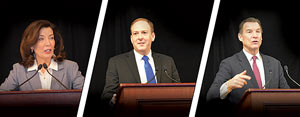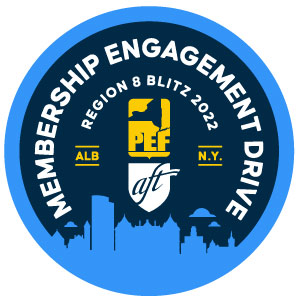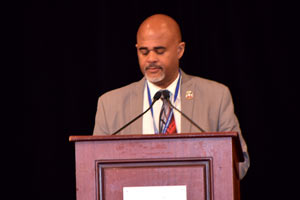The PEF Executive Board met March 24 and 25 in Troy, N.Y., voting on the 2022-23 budget, hearing from three gubernatorial candidates and conducting other business of the union.
2022-23 budget
PEF Secretary-Treasurer Joe Donahue presented the 2022-23 budget for approval, with proposed $28,657,861 in revenue and the same in expenditures – a zero net change budget.
He outlined amendments to the Dec. 13, 2021 financial statements to account for higher than expected expenditures, including printing costs for the 2019-22 contract book; increased office supply, communications and minor equipment costs for the new PEF Headquarters; and an increase in janitorial and security expenses.
The advertising budget increased to cover the Fund Our Future campaign and to purchase PPE for members. Scholarship funding, affiliation fees and professional fees also increased.
Donahue pointed out the new vendor for election balloting, Educational Vistas, is more expensive than the previous vendor and the need for running Executive Board seat balloting every quarter costs the union $20,000 each time, regardless of whether there are candidates.
“We have to run the opportunity for an election, even if people don’t run, we are still charged each time we do it,” he said, urging all members of the board to seek out members who may be interested in filling those vacancies.
Membership dues saw a bump in the fall due to retroactive raises in the new contract, but membership numbers continue to decline. Donahue said PEF will continue to look at ways to increase those numbers, including hiring two new organizers.
“For the 2021-22 budget year, membership was estimated at 50,000,” he said. “These rates have continued to decline throughout the fiscal year, leading to a conservative estimate of 47,000 members for the 2022-23 fiscal year.”
In the coming year, proposed expenditures are up largely due to the anticipated return to in-person meetings, activities and the 2022 PEF Convention in Niagara Falls.
“We cannot increase budget items to pre-pandemic levels, but we want to be able to hold more in-person and that will mean additional costs,” he said. “We’re here to serve the members.”
The board approved the budget. Board approves PAC endorsements
The Statewide Political Action Committee recommended candidate endorsements to the executive board for the following candidates for attorney general, Senate districts (SD) and Assembly districts (AD):
Leticia James, Attorney General; Kevin Parker (SD 21); Brian Kavanaugh (SD 26); Luis Sepulveda (SD 32); Cordell Cleare (SD30); Robert Jackson (SD 31); Erik Dilan (AD 54); Peter Abbate (AD 49); Vivian Cook (AD 32); Kevin Cahill (AD 103); Tom Abinanti (AD 92); Michael Benedetto (AD 82); and Eddie Gibbs (AD 68).
“This is a major part of what political action committees across the regions do,” said Vice President Randi DiAntonio, who chairs PEF’s Statewide Political Action Committee. “Regions have the responsibility to send out questionnaires, interview and determine which candidates in their regions they want to recommend for endorsement. The process is open to all members in the region.
“PEF does not generally get involved in early endorsements in primary races,” she continued. “However, sometimes it behooves us to get involved. Good allies may need our support to remain in office.”
The endorsements were approved by the board.
Gubernatorial candidates address board
 Three candidates vying for New York State Governor – Gov. Kathy Hochul, Congressman Tom Suozzi and Congressman Lee Zeldin – addressed the PEF Executive Board seeking the union’s endorsement, answering questions submitted by the membership on the nursing shortage, telecommuting, the Fund Our Future campaign, privatization and toxic workplace culture.
Three candidates vying for New York State Governor – Gov. Kathy Hochul, Congressman Tom Suozzi and Congressman Lee Zeldin – addressed the PEF Executive Board seeking the union’s endorsement, answering questions submitted by the membership on the nursing shortage, telecommuting, the Fund Our Future campaign, privatization and toxic workplace culture.
Suozzi took the stage first on March 24, followed by Zeldin, and Hochul addressed the board on March 26. New York City Public Advocate Jumaane Williams, who is also running in the Democratic gubernatorial primary, was unable to attend.
“This is it, right now, this is the time we all need to pull together,” Suozzi said. “We need to start doing things that serve the people. We have got to fight for the middle class and unions are the way to do it. We have to fight for our unions.”
Zeldin said New York is very different right now than in previous years.
“People don’t feel safe on the streets, in the subways,” he said. “New Yorkers across the state are deciding, ‘That’s it’ and they’re leaving.”
Hochul said it’s an honor to be surrounded by the dedicated and compassionate members of PEF.
“I’ve been defending public sector workers since those days,” she said, recounting her family’s history of social justice. “You’re doing the work because you believe in public safety, health care, front line workers in every sense of the word.”
On the nursing shortage and exodus of nurses from the state, Suozzi said the key is figuring out how to pay nurses salaries that are competitive with the private sector and that the disparity is demoralizing and unfair.
“I love nurses,” he said. “My mother was a nurse. I have great respect for nurses. We have got to figure out how to pay our nurses to be competitive with the private sector.”
Zeldin said nobody should be fired for not getting the COVID vaccine and nurse pay needs to be competitive.
“If they are not paid enough for what they do, they end up being hired away to someplace paying more,” he said. “Some people just love the work. A lot of people are early in their careers and the benefits aren’t as generous.”
Hochul pointed to her first budget as reflection of her dedication to nursing.
“A budget for the first time ever leaned hard into shoring up the nursing profession,” she said. “The disinvestment has gone on for too long. Yes, this is bold and ambitious and expensive, but if we don’t make these investments now, shame on us.”
PEF members stepped up and successfully telecommuted since the start of the pandemic. The membership wants to know if the next governor will continue or improve remote work options.
Suozzi said telecommuting made life easier for a lot of people, but it must be balanced and fair.
“Some jobs you can do remotely, but not everybody can telecommute. We need to set up an accountability system,” he said.
Zeldin said telecommuting makes sense for many occupations, but some people are more productive than others when working from home.
“You need to keep a short leash,” he said. “You can’t paint all people with the same brush.”
Hochul said she would be willing to come to the table and negotiate telecommuting with PEF.
“This COVID experience has given us an opportunity to examine new ideas,” she said. “This is something we will consider in all our collective bargaining agreements. The five-day work week is probably over. But there also needs to be a sense of fairness involved.”
Investing in the future of New York, both the workforce and the services it provides, is crucial for a thriving New York.
Zeldin said investing in state services can actually save money by reducing the number of clients who slip through the cracks.
“Investing saves money in the long run,” he said. “A lot of people will rely more on the government if you don’t help them.”
Hochul credited a conversation with President Spence for inspiring investments in her budget.
“We’re going to continue investing,” she said. “It means hiring more people. There should not be vacant positions. If a position was created, obviously there was a need for it. I want New York to be a model employer.”
The Tier 6 pension plan falls short and PEF is working in the legislature to amend the plan.
Suozzi said good pay, good benefits and a robust pension draw people into public service and that needs to be studied and discussed.
Zeldin said the pension is a huge recruitment and retention tool. “We have to look at the entire package,” he said. “Think creatively. Pensions are one piece.”
Hochul was willing to discuss pension reform.
The fight against privatization calls for keeping state work in the hands of state employees. PEF advocates for looking inward, not out to contractors, for projects and services. A cost-benefit analysis is vital to a fair and transparent process.
Suozzi supports cost-benefit analyses and using the state workforce, pointing out that the previous administration brought in outside contracts frequently.
Zeldin also recognized the importance of cost-benefit analysis and said hiring consultants to tell you what you already know is a waste of money.
“The best source of ideas comes from inside the agency,” he said.
PEF members across the state face a toxic workplace. Candidates were asked what they would do to hold management accountable and lift up employees.
Suozzi said there needs to be accountability and there must be rules and regulations and a process to follow. “I believe New York can be the model employer,” he said.
Zeldin said the culture trickles from the top down and some people think they are more important than others. “We don’t want an emperor government,” he said. “You need to respect your peers.”
Hochul pledged to change the culture and how abuses are handled.
“No longer should someone have to report an abuse to the same people who are protecting the people who are doing it,” she said.
The PEF regional PACs will meet and make a recommendation to the Statewide Political Action Committee who will ultimately make an endorsement recommendation for governor that the Executive Board will consider at their June 2022 meeting.
Organizing ‘Blitz’ in Albany
 Late next month, in partnership with AFT, and with help from an SEIU grant, PEF will hold a membership “blitz” in Albany, knocking on doors and engaging with potential members face-to-face.
Late next month, in partnership with AFT, and with help from an SEIU grant, PEF will hold a membership “blitz” in Albany, knocking on doors and engaging with potential members face-to-face.
“A blitz is a mobilization effort to reengage members of the union and to do it in a very personal, one-on-one, way,” said PEF Director of Organizing Dan Carpenter. “The last time we did this, in 2017, there was an 18-person team broken into six teams that went and visited 27 different worksites in a week. They knocked on 1,300 doors and had one-on-one conversations with members across Region 8.”
PEF organizers participated in other union blitzes in Alaska, Montana and Colorado, Carpenter said. Now is the time to bring the blitz back to PEF, since new hires have to opt in to union membership after the Janus decision and reaching them has been difficult.
“During COVID we lost the ability to hold in-person traditional onboarding,” Carpenter said. “A number of people fell through the cracks. We are taking the opportunity to work with AFT. They bring 18 members from across the nation and we’re going to bring 18 staff and members and we are going to do this all over again. The goal is to knock on 1,000 doors and hold 50 to 55 worksite meetings in a week.”
Carpenter said the team hopes to reach at least the 500 full-time hires who are not currently in the union. The blitz will take place April 24-29, 2022.
This is just the first blitz. PEF plans to use it as a model to hold mini-blitzes around the state.
Legislative engagement and updates
Texting is a successful way to get members involved in legislative letter-writing campaigns, said Vice President DiAntonio. She reported members submitted 1,713 letters on telecommuting; 459 on the ITS budget; 1,041 on the social safety net; 996 on health care bonuses; 484 on reinvestment to DOCCS programs; 545 on design-build; and 8,538 on pension reform.
“There are lots of opportunities to engage members over this,” DiAntonio said. “This is how we communicate our issues with our legislators. They do take note of the numbers of letters. Getting thousands of emails, letters, pushes on Facebook, wherever we can let them know where our concerns are.”
Members are encouraged to make sure PEF has an accurate cell phone number and personal email address so they can participate in member actions.
PEF Legislative Director Patrick Lyons said this is a very different year in Albany.
“This is really the first year that we’re not on a major defensive in terms of the state budget,” he said.
Top priorities in Albany this year include those outlined in the Fund Our Future campaign, as well as health care investments, cost-benefit analysis and design-build, OPWDD and OMH service investments, amending the ‘Less is More’ parole law, significant funding of SUNY hospitals, and reforming Tiers 5 and 6 of the New York State pension plan.
Legal department addresses vaccine, testing mandate cases
As of March 23, 2022, there were 383 members suspended and facing termination on allegations they failed to comply with the vaccine mandate or that they were subject to a vaccinate or test mandate and they have not complied with testing. Those numbers continue to increase on a weekly basis.
“We are actively representing hundreds of members,” said General Counsel Edward Greene. “Arbitration hearings are currently under way in dozens of cases and we are starting to see some arbitration awards.”
The breakdown of cases as of March 23rd includes 236 for vaccine mandate non-compliance and 147 for testing, Greene reported. Successes so far have come in cases where procedural defenses have been raised. “Our victories to date have been where we have identified procedural irregularities or due process violations,” he said. “We are continuing the fight. Our attorneys are engaged every day in one or more hearings in these cases.”
There have been victories on these procedural issues, with members reinstated and the issuance of backpay and accruals that amount to tens of thousands of dollars to members.
Training, education benefits you may be missing

Through the PS&T contract’s Article 15, members can participate in Public Service Workshop Program (PSWP) trainings, continuing legal education, a nursing grant program, leadership development, certification and licensure exam fee and college tuition reimbursements and more.
“I think many of our members don’t know about a lot of the offerings in our contract,” said President Spence. “They don’t even know some of the stuff we have at Membership Benefits. I suspect members are spending their hard-earned money on programs and they don’t know they can utilize some of these.”
Between the 2016 and 2019 agreement, 16,261 state employees participated in 779 in-person PSWP workshops ranging from project management to data analysis, to professional writing. There were 10 Leadership Development Program offerings, with 390 PEF members participating. Seventy-eight nurses completed the Nurse Leadership Development Program.
Through the College Tuition Reimbursement Program, 12,990 applications were reimbursed to the tune of $16,976,595. Of that, $3,217,383 was reimbursed through the Nurses Enhanced program.
Direct any questions about any of the programs to kim.loccisano@pef.org.
The PEF Executive Board will meet again on June 9 and 10, 2022, in Albany.
